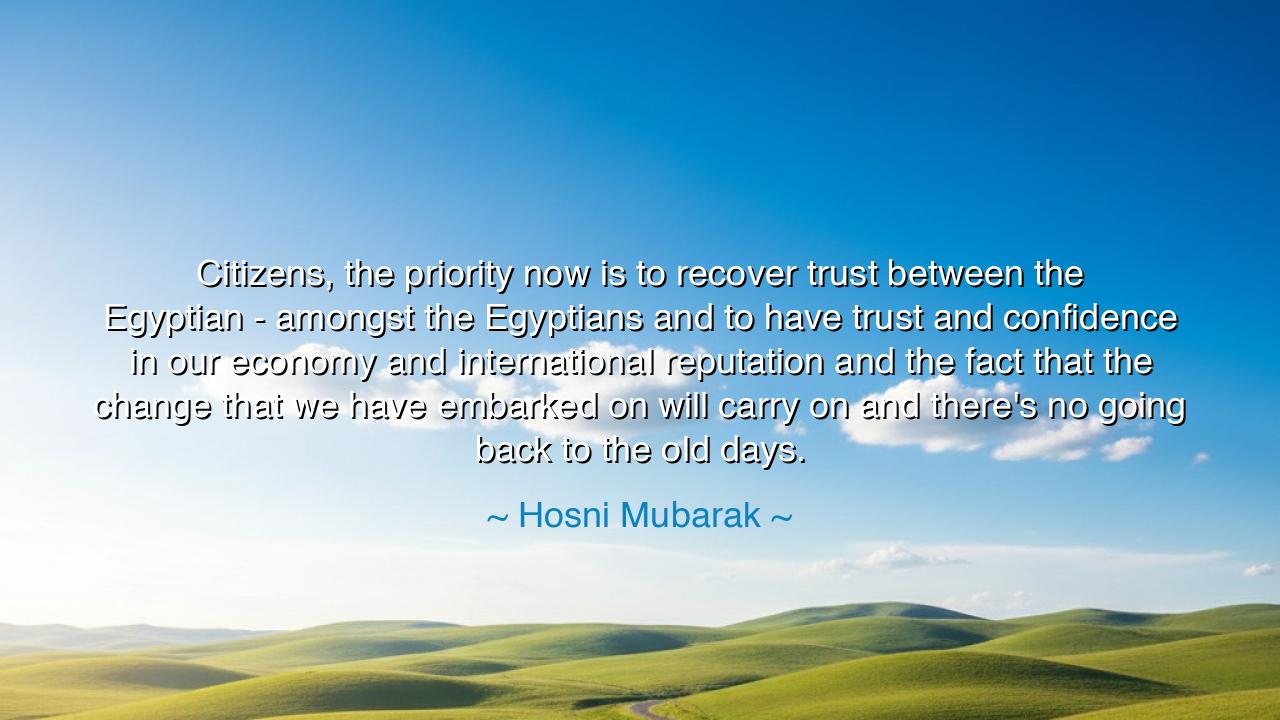
Citizens, the priority now is to recover trust between the
Citizens, the priority now is to recover trust between the Egyptian - amongst the Egyptians and to have trust and confidence in our economy and international reputation and the fact that the change that we have embarked on will carry on and there's no going back to the old days.






In the words of Pharaoh and ruler, Hosni Mubarak, there is a plea, both political and timeless: “Citizens, the priority now is to recover trust between the Egyptian – amongst the Egyptians and to have trust and confidence in our economy and international reputation and the fact that the change that we have embarked on will carry on and there's no going back to the old days.” These words were spoken in the turmoil of shifting sands, when the hearts of the people trembled with both hope and fear. He calls not for weapons, nor for the raising of monuments, but for the restoration of that which is more fragile and yet more enduring than stone: trust.
For what is trust but the sacred thread that binds a people together? Without it, nations crumble, families splinter, and even the strongest armies falter. To speak of trust among Egyptians is to speak of unity, for Egypt, the land of the Nile, has endured for millennia because its people believed, however faintly, that they shared a destiny. Mubarak, seeing the unrest, sought to remind them that the journey toward change cannot be walked with suspicion in the heart. Only through trust in one another and trust in the economy and reputation of the nation could Egypt rise again.
Consider, O listener, the story of the rebuilding of Athens after the Persian wars. The city was burned, its temples desecrated, its citizens scattered in doubt. Yet Themistocles and later Pericles urged their people not to return to the old days of weakness but to trust in the new vision of Athens as a beacon of democracy and strength. And so the Parthenon was raised, fleets were built, and Athens shone as the glory of Hellas. Had the Athenians clung to mistrust and despair, their history would have ended in ashes. Thus do the ancients testify: the confidence of a people is mightier than walls or weapons.
Mubarak’s words, though heavy with the breath of a ruler clinging to power, carry a universal lesson: there is no going back to the old days. Whether the old days were filled with oppression, stagnation, or division, once a people have awakened to the possibility of change, the path backward vanishes. It is like the Nile flowing northward—it does not reverse course, no matter how much men may wish it so. The duty of the citizen, then, is not to look behind in longing or bitterness, but forward with courage and resolve.
Yet trust is not built by command alone. It is nourished by action, by justice, by fairness between neighbor and neighbor. A farmer who cheats his brother of water destroys more than a crop; he erodes the foundation of faith in the land itself. So too, when leaders betray promises or citizens scorn one another, the fabric of trust tears. To recover it requires patience, humility, and the steady proof of deeds. Like the mason who sets stone upon stone, trust must be rebuilt one act at a time until the temple of unity stands tall once more.
The emotional cry within Mubarak’s plea reveals another truth: reputation before the world is a reflection of the spirit within. If a nation is torn apart, how shall the nations respect it? But if a people walk in harmony, even the farthest lands hear of their strength. Remember the Japanese after the devastation of Hiroshima and Nagasaki—how they, with discipline and shared trust, rebuilt their land into an economic marvel admired by the world. They did not return to the old days of feudal weakness or wartime ruin. They carried forward into a new age, hand in hand, bound by confidence in themselves.
Therefore, children of tomorrow, learn this: trust is the true wealth of a people. Guard it more dearly than gold, for without it the richest nation is poor, and with it, even the barren desert may bloom. In your own lives, do not be quick to sow suspicion. Speak with honesty, labor with fairness, and hold faith with your companions. When storms arise—whether in your family, your work, or your nation—remember that the only bridge to the future is trust, and there is no crossing without it.
Thus the teaching is clear: never cling to the “old days” of bitterness and mistrust. Instead, sow confidence in one another, believe in the strength of your shared endeavor, and act in ways that honor the trust of those around you. Only then shall you walk forward as a people, as a family, as a soul, into the dawn that awaits.






AAdministratorAdministrator
Welcome, honored guests. Please leave a comment, we will respond soon